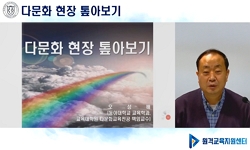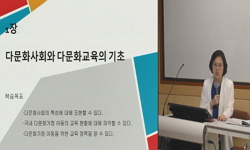Economic integration and interdependence of national economies has increased through a rapid augmentation in cross-border movement of goods, services, technology and capital. The effects of globalization exert intense influence on the social, politica...
http://chineseinput.net/에서 pinyin(병음)방식으로 중국어를 변환할 수 있습니다.
변환된 중국어를 복사하여 사용하시면 됩니다.
- 中文 을 입력하시려면 zhongwen을 입력하시고 space를누르시면됩니다.
- 北京 을 입력하시려면 beijing을 입력하시고 space를 누르시면 됩니다.

Understanding Multicultural Society from the Perspective of the Old Testament: Focusing on the Problem of the Stranger (Ger)
한글로보기부가정보
다국어 초록 (Multilingual Abstract)
Economic integration and interdependence of national economies has increased through a rapid augmentation in cross-border movement of goods, services, technology and capital. The effects of globalization exert intense influence on the social, political and economic conditions of a given nation. Specifically, globalization accelerates the birth of multicultural societies in countries who participate in the world market. The coexisting heterogeneous elements of multicultural society could be causes for social conflicts and disputes. Among the problems of the current multicultural society that of immigrants is becoming one of the most important issues. In order to understand multicultural society and to seek the biblical point of view concerning our problem, I focused on the problem of the stranger (ger)in the Old Testament. Here there are economic, political and individual reasons for being a stranger. In the Old Testament the protection of the stranger is regulated in many ways. The requirement that Israel should protect the stranger is based on IsraelØs historical experience, GodØs love of the weak and IsraelØs self-consciousness as the stranger before God. The Old Testament is showing us the ways and steps from the concrete regulations for protecting the weak and strangers to the ideal vision of their integration into society. The study on the problem of the stranger (ger) in the Old Testament sheds light on the nature of modern multicultural societies and the task of solving some of its problems. The witnesses of the Bible are formed in the dynamics of the reciprocal relationship between social experience and theological insights. They are the mirror of an inner-process of reception and updating that evokes to continue interpreting and adapting the words of God in the current world. The following steps and tasks are needed for a successful multicultural society overcoming the human and social problems of the stranger. 1. The particular care and concern of existing dwellers in the land for the underprivileged stranger. 2. The support of the stranger should be done with concrete help and actions. 3. All the efforts for strangers have to be aiming for integration into a society in which all members enjoy equal rights and protection.
참고문헌 (Reference)
1 Gowan, D. E., "Wealth and Poverty in the Old Testament; The Case of the Widow, the Orphan, and the Sojourner" 41 (41): 341-353, 1987
2 Sundermeier, Theo, "Understanding the Stranger: Aspects of Interreligious Hermeneutics" 29 (29): 181-188, 2002
3 Levenson, J. D., "Theology of the program of restoration of Ezekiel 40-48" Scholars Pr 1976
4 Schreiner, J., "Theologie des Alten Testaments" Echter 1995
5 Wenham, G. J., "The Book of Leviticus (NICOT)" William B. Eerdmans Publishing 1979
6 Block, D. I., "The Book of Ezekiel Chapters 25-48 (NICOT)" William B. Eerdmans Publishing 1998
7 Albertz, R., "Religionsgeschichte Israels in alttestamentlicher Zeit 1" Vandenhoeck & Ruprecht 245-261, 1992
8 Estes, Daniel J., "Metaphorical Sojourning in 1 Chronicles 29:15" 53 : 45-49, 1991
9 Kuchler, M., "Jerusalem, in: NBL Ⅱ"
10 Crusemann, F., "Ihr kennt die Seele des Fremden(Ex 23:9)" 29 : 339-347, 1993
1 Gowan, D. E., "Wealth and Poverty in the Old Testament; The Case of the Widow, the Orphan, and the Sojourner" 41 (41): 341-353, 1987
2 Sundermeier, Theo, "Understanding the Stranger: Aspects of Interreligious Hermeneutics" 29 (29): 181-188, 2002
3 Levenson, J. D., "Theology of the program of restoration of Ezekiel 40-48" Scholars Pr 1976
4 Schreiner, J., "Theologie des Alten Testaments" Echter 1995
5 Wenham, G. J., "The Book of Leviticus (NICOT)" William B. Eerdmans Publishing 1979
6 Block, D. I., "The Book of Ezekiel Chapters 25-48 (NICOT)" William B. Eerdmans Publishing 1998
7 Albertz, R., "Religionsgeschichte Israels in alttestamentlicher Zeit 1" Vandenhoeck & Ruprecht 245-261, 1992
8 Estes, Daniel J., "Metaphorical Sojourning in 1 Chronicles 29:15" 53 : 45-49, 1991
9 Kuchler, M., "Jerusalem, in: NBL Ⅱ"
10 Crusemann, F., "Ihr kennt die Seele des Fremden(Ex 23:9)" 29 : 339-347, 1993
11 Kellermann, D., "Gûr, in: ThWAT Ⅰ"
12 Wright, Christopher J. H., "God's people in God's land : family, land, and property in the Old Testament" Paternoster Press 1990
13 Gorg, M., "Fremdsein in und fur Israel. in: Die Fremden (Theologie zur Zeit, Bd. 4)" Patmos 194-214, 1988
14 Steins, G., "Fremde sind wir : Zur Wahrnehmung des Fremdseins und zur Sorge fur die Fremden in alttestamentlicher Perspektive" 35 : 133-150, 1994
15 Eichrodt, W., "Ezekiel (OTL)" SCM Press 1970
16 Durham, J. I., "Exodus (WBC)" Word Books 1987
17 Spieckermann, H., "Die Stimme des Fremden im AT" 83 : 52-67, 1994
18 Kaiser, O., "Die Auslander und die Fremden im Alten Testament" 14 : 65-83, 1997
19 Schreiner, J., "Der Nachste-der Fremde-der Feinde: Perspektiven des Alten und Neuen Testaments" Echter 2000
20 Bultmann, Chr., "Der Fremde im antiken Juda" Vandenhoeck & Ruprecht 1992
21 Albertz, R., ""Ihr seid Fremdlinge Agypten gewesen"; Fremde im AT. in: Der Mensch als Huter seiner Welt" Calwer 61-72, 1990
22 Lorenz, W., ""For We are Strangers before Thee and Sojourners" 2 Chron. 29:15" 9 (9): 268-280, 1990
동일학술지(권/호) 다른 논문
-
Statement For a World of Peace: A World Free of Nuclear Weapons An Ecumenical Call from Hwacheon
- 한국민중신학회
- Statement
- 2010
- KCI등재
-
New Voices: Threat of Promise?
- 한국민중신학회
- John L. Kater
- 2010
- KCI등재
-
Encountering the Minjung through Three Symbols: The Multitude, the Inmin, and the Subaltern
- 한국민중신학회
- 권진관
- 2010
- KCI등재
-
- 한국민중신학회
- 박영란
- 2010
- KCI등재
분석정보
인용정보 인용지수 설명보기
학술지 이력
| 연월일 | 이력구분 | 이력상세 | 등재구분 |
|---|---|---|---|
| 2024 | 평가예정 | 계속평가 신청대상 (계속평가) | |
| 2022-01-01 | 평가 | 등재후보학술지 선정 (신규평가) |  |
| 2021-12-01 | 평가 | 등재후보 탈락 (계속평가) | |
| 2019-01-01 | 평가 | 등재후보학술지 선정 (신규평가) |  |
| 2018-12-01 | 평가 | 등재후보 탈락 (계속평가) | |
| 2017-12-01 | 평가 | 등재후보로 하락 (계속평가) |  |
| 2013-01-01 | 평가 | 등재 1차 FAIL (등재유지) |  |
| 2010-01-01 | 평가 | 등재학술지 선정 (등재후보2차) |  |
| 2009-01-01 | 평가 | 등재후보 1차 PASS (등재후보1차) |  |
| 2007-01-01 | 평가 | 등재후보학술지 선정 (신규평가) |  |
학술지 인용정보
| 기준연도 | WOS-KCI 통합IF(2년) | KCIF(2년) | KCIF(3년) |
|---|---|---|---|
| 2016 | 0.23 | 0.23 | 0.15 |
| KCIF(4년) | KCIF(5년) | 중심성지수(3년) | 즉시성지수 |
| 0.11 | 0.09 | 0.517 | 0 |




 KCI
KCI 스콜라
스콜라





